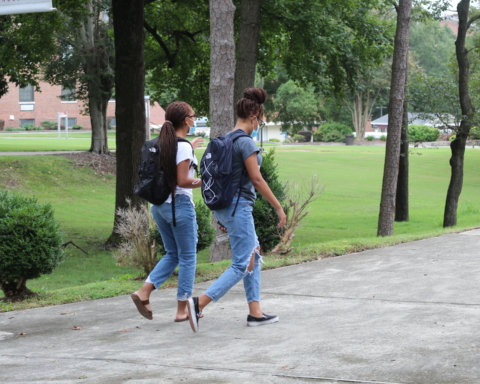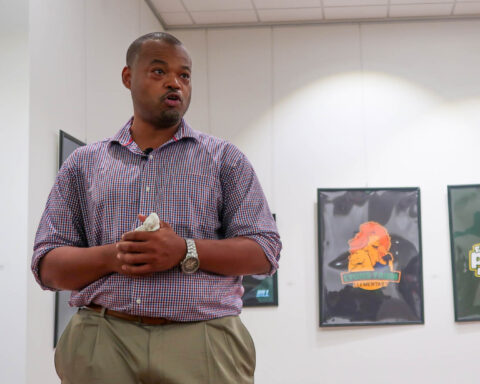The African American valedictorian of a wealthy, mostly white and proudly progressive community in Arlington, Va., lands under the microscope when a school assignment triggers warning bells for his teacher and adoptive parents in the electrifying Sundance entry “Luce.”
But it’s America that’s truly being scrutinized — and the audience who are being asked to question their own assumptions — in filmmaker Julius Onah’s provocative “social thriller,” adapted from a play by JC Lee.
“We want to believe that we’re all fair and equal and progressive, for a lot of us who are liberals — but in so many ways we’re not aware of our own blind spots,” said Onah from Park City, where “Luce” premiered Sunday in U.S. dramatic competition. “And that, I think, is part of the reason we’re in such
A carefully nuanced drama that unfolds with the menace of a genre thriller, “Luce” asks: What becomes of someone trying to find their own autonomous identity when society dictates they be either saint or monster, and allows for nothing in between?
The external expectations placed on young black men in America — even by well-meaning allies like Amy (Naomi Watts) and Peter (Tim Roth), the white parents who adopted Luce (Kelvin Harrison Jr.) from war-torn Eritrea 10 years ago, or the school administrators who laud him as a shining example — explode in deep-cleaving bursts of emotional violence in the film, as those who have held Luce up to a faultless ideal for years begin to question whether he is capable of harm.
Onah, who moved from Nigeria to the U.S. at age 10, saw his own unique American experience in Lee’s play and wrote his first draft in three weeks before finishing the script with Lee.
In the U.S., he’d grown up the son of an ambassador living in the affluent suburbia of Arlington, where he would later set “Luce.” But in his early adulthood Onah had also lived and worked as an undocumented busboy on New York’s Lower East Side while waiting for a long immigration process to be completed.
“It was interesting to see how people’s attitudes or expectations of me shifted depending on the context,” Onah said. “And as somebody who moved to America when I was 10 years old as well, there was the part of my life where I was an African, and the part of my life when I became an African American and I inherited a history that wasn’t one that was connected to my direct lineage.”
He had yet to complete post-production on last year’s sci-fi Netflix release “The Cloverfield Paradox” when he decided it was time to make “Luce,” with 24-year-old Harrison in the lead role, Watts and Roth as Luce’s loving parents, and Octavia Spencer as Harriett Wilson, the history teacher who becomes his toughest adversary.
At the tail end of 2016, a sense of post-election urgency had lit a fire under Onah to make the film. “I just felt really galvanized to make something that was asking some real questions about our culture,” he said, “because obviously some of the people didn’t see what was coming with Trump.”
And though Lee’s original play had been written during the Obama era, the material and its concerns over race, class, gender and privilege became increasingly relevant over time. In the years between the play’s 2013 staging and the film’s Sundance debut, the Black Lives Matter and #MeToo movements brought further topicality to the story’s primary interrogations, Onah said.
“These issues have been there bubbling beneath the surface in so many ways,” he said. “… Trump’s election was like piercing the skin and creating a rupture, where we really have to face things that we thought we were moving beyond.
“I think if Hillary [Clinton] had been elected, it would have continued that same forward march of progress and justice that we thought we were having with Obama — but in reality [the election] was just exposing so much of what was underneath the surface that we hadn’t reconciled with.”
Harrison, who has built an impressive filmography in short time with films including “Mudbound,” “It Comes At Night,” “Monsters and Men,” and “Jinn,” said he had just finished filming “Assassination Nation” when he was sent the script for “Luce” and read it in one sitting.
“I couldn’t take my eyes off the page,” said Harrison, adding that he related to Luce’s frustrations and shared similar experiences growing up attending a majority-white high school in New Orleans. “I kept relating to it, like, ‘I know an Amy. I know Peter. I know Luce. I know Harriett.’
“[Luce] is really complicated and he’s a revolutionary, and I think that’s what we’re all striving to be, because that’s what we’re told we’re supposed to be. At the same time, the journey to get there is not easy, and that’s what I’ve learned over time.”
He plays the high-achieving Luce with uncanny dexterity, showing the teenager’s idealized facets to the people around him who see him as whatever they prefer: Doting son, model student, star athlete, caring friend.
“Luce will say dark things, but at the same time, they’ll sound so light — and he’ll do it with a smile on his face,” Harrison said, adding that he modeled Luce’s public-facing comportment on figures such as Will Smith and President Obama.
“He’s always smiling, making it easy for the other person, because that’s what we do — make it easy for the person who might be fearful of us. It’s making it easy for everyone else but ourselves. It’s that thing that a lot of black men [experience]: You have to work 10 times as hard as the other person because of who you are, your skin color, or what you look like.”
To the film’s audience, Harrison reveals much more: The subtle internal calculations Luce, hyper-aware that he will not be allowed to fail, is constantly running. He’s always doing the math to figure out what people want from him, while trying desperately not to cave under the pressure of an entire community’s expectations.
“This is the boy that they wanted him to be — and he’s trying so hard, and that’s the fight,” he said. “The soul against the armor that we put up to survive. That’s what it is, and now he’s tired.”
To his parents, teacher, teammates and girlfriend, Luce is a cipher by design. Onah’s directorial approach, complemented by a pulsing score by “Annihilation” composers Geoff Barrow and Ben Salisbury, asks viewers to reevaluate the way they see this young black man by challenging how he is seen by the characters around him.
“And as those expectations change, not only are you questioning him — you start to question everybody in his orbit,” Onah said. “The audience is forced to ask themselves really hard questions about the way their attitudes impact the expectations we put on other people, and on a much larger level have an impact on how power and privilege work in this society.”
Onah noted the work of Michael Haneke as one influence on “Luce,” particularly 2005’s “Caché,” a reference he gave his cast, and said he sees a kinship with Jordan Peele’s “Get Out” and the Austrian thriller “Revanche” — films that embrace genre storytelling but have historical-cultural traumas in mind, not just scares.
“They’re movies that are trying to ask you questions — they’re trying to remind us that discomfort is not necessarily a bad thing when it comes to dealing with these really pressing issues — because we live with that discomfort,” he said. “We live in uncomfortable times.”
Moviegoers looking for more easily digestible stories about respectability politics have plenty of other options, he said (diplomatically declining to name names).
“There are a number of movies out right now or that have been out recently that explore political and social dynamics in a way that seeks to reassure the audience, or hold their hand a little bit more and uplift you,” he said.
“I’m not saying there’s not room for those kinds of stories … but I do strongly believe that if you’re trying to create culture and create work that helps us change culture, you have to have stories that aren’t just pacifying us.”
Story by Jen Yamato
L.A. Times (Tribune News Service)



















